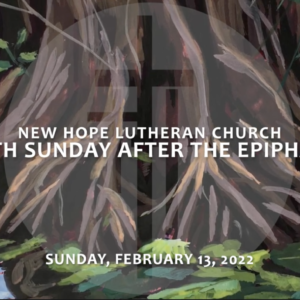Luke 6:17-26
17 Jesus came down with the twelve and stood on a level place, with a great crowd of his disciples and a great multitude of people from all Judea, Jerusalem, and the coast of Tyre and Sidon. 18 They had come to hear him and to be healed of their diseases; and those who were troubled with unclean spirits were cured. 19 And all in the crowd were trying to touch him, for power came out from him and healed all of them.
20 Then Jesus looked up at his disciples and said:
“Blessed are you who are poor,
for yours is the dominion of God.
21 “Blessed are you who are hungry now,
for you will be filled.
“Blessed are you who weep now,
for you will laugh.
22 “Blessed are you when people hate you, and when they exclude you, revile you, and defame you on account of the Son-of-Man. 23 Rejoice in that day and leap for joy, for surely your reward is great in heaven; for that is what their ancestors did to the prophets.
24 “But woe to you who are rich,
for you have received your consolation.
25 “Woe to you who are full now,
for you will be hungry.
“Woe to you who are laughing now,
for you will mourn and weep.
26 “Woe to you when all speak well of you, for that is what their ancestors did to the false prophets.”
———————-
Please pray with me this morning, church:
Generous God,
We feel very blessed today, and we are.
Which might mean we find ourselves
Listed among your woes more often than not.
Remind us, again, of your incredible
Generosity toward us.
Help us to live generous lives
In response to your gift.
Amen.
———————-
When I was applying to seminary, I was invited to participate in a scholarship process that eventually awarded me quite a bit of aid for my entire 4 years of seminary. It would end up being a significant amount of debt that I didn’t have to take on. When it came to being assigned our ministry learning parishes during our second year, I got my first choice, exactly the site I wanted to learn at. Same with my Chaplaincy Internship, exactly where I wanted to serve. Same with my Internship, my first choice that was exactly the setting I wanted to serve in.
Do you ever get this foreboding sense in your life that things have just been going too well for too long, and you get nervous about the next choice you have to make because you just know that at some point the other shoe’s going to drop and your luck is going to run out…?
As we approached the end of my 4 years of seminary and got ready to release my paperwork out into the ELCA world, as we approached the time when the Bishops would get together and decide which seminary Candidates were going to be assigned to which geographical areas…I just knew that it was going to be that time that other shoe was going to drop. Like, of course it would happen during Assignment, this time after my 4 years of study that would literally decide where my family and I would move…a group of Bishops sitting in a room, in many ways deciding my family’s fate, at least in terms of where we would live. I’ve never felt so unlucky as I did during those couple of weeks.
It did end up working out. Quite well, I think. I ended up here, with all of you lovely people, and it has been extraordinarily good for my family. So, thank you. But have you ever felt that? Like at some point, that the blessings are going to run dry and you’ll get caught up in this cycle of woes that you’ll have to physically claw your way out of.
When things are going well for me, it seems as if all I can focus on is some indeterminate time in the future when they will stop. During my seasons of struggle, it seems as if I can only see how great everything is for everyone else around me, how much everyone else isn’t struggling.
So is it true that we are either blessed or not? Is it as cut-and-dry as it seems that the author of Luke is suggesting, either “blessed are you” or “woe to you”?
I don’t think so. I think there’s a lot of nuance.
But our lived experiences certainly would have us feel as if things are either “this” or “that.”
This section from the Gospel of Luke mirrors a similar section from the Gospel of Matthew. It’s a collection of sayings from Jesus, likely not all said at the same time except it makes for good storytelling, so the authors pulled all these stories and sayings together and structured them as if Jesus is preaching, and so we call it a sermon. For the author of Matthew this occurs on the side of a mountain, so taken all together we call it the Sermon on the Mount. The author of Luke writes that just before this Jesus goes up on a mountain to pray and choose twelve apostles from among the many disciples, and then Jesus comes down from the mountain and stands “on a level place”…and so this is known as the Sermon on the Plain.
This level place is important in the Gospel of Luke. Throughout the gospel, Jesus is constantly speaking to this great leveling—from Mary’s Magnificat where the lowly are lifted up and the powerful are brought low, John the baptizer being cast in the same vein as the prophet Isaiah “…crying out in the wilderness, ‘Prepare the way of the Lord and make the Lord’s paths direct. Every valley filled and every mountain brought low, the crooked places aligned and the rough places made smooth,’” to Jesus’ first words in the synagogue also from the prophet Isaiah “the spirit of the Lord has sent me to proclaim good news to the poor and release to the captives and recovery of sight to the blind and the year of the Lord’s favor, the year of Jubilee,” to Luke’s version of the Beatitudes this morning where the kingdom of God belongs to the poor, the hungry are filled, the mournful laugh, and the reviled are given a great reward in heaven…but woe to the rich and the full and the carefree and the well-liked.
For Jesus, in the Gospel of Luke, the kingdom of God—God’s promised future and the fullness of God’s vision for the world—stands diametrically opposed to the kingdoms of the world, specifically overagainst the Roman Empire, but also stands overagainst our empires in our time. The kingdom of God is at odds with worldly powers. Worldly empires exalt the rich and famous and lift up the haves…the kingdom of God lifts up the lowly and the outcast, the hungry, the material poor, the housing and food insecure, the downtrodden, and the destitute. The kingdom of God is good news for the have-nots.
And if, like me, you find yourself in positions of relative comfort, just kind of waiting for the other shoe to drop amidst what is, quite truthfully, a fairly charmed life…it sounds like not-so-good news…
But, as I said earlier, what if the reign of God isn’t as cut-and-dry, this-or-that as we experience so much in our world? While the kingdom of God stands diametrically opposed to the kingdoms of this world, what if life within this promised future isn’t such a dichotomy?
In First Corinthians, St. Paul lays out his rhetorical argument that the resurrection is the key to everything. It’s a lot to try and work through and Paul doesn’t make it easy with the way he writes, but essentially, Paul is saying that for the Christian, resurrection is everything. “If there is no resurrection then Christ wasn’t raised, and if Christ wasn’t raised then our preaching is in vain and your faith is in vain.” If there is no resurrection of Christ or resurrection of the dead, then faith is nothing. The whole point is the resurrection.
God’s desire for God’s creation is resurrection, which is to say that God’s desire for the world is transformation, a journey and a through-line from death to life. God desires life for you and God desires life for your neighbors, and when your neighbor is suffering or is living a less than full life or a life that is anything less than abundant and thriving, then God’s desire for you is that you do what you can with what you have to help your neighbor live the abundant and thriving life that God intends for them. When each of us looks not to our interests, but to the interests of others, as St. Paul will say in Philippians, then everyone is looking out for everyone else, and collectively, we are doing what we can to ensure that everyone is living a full and abundant and thriving life that God intends.
This isn’t some strange ideology of a fringe remote commune, this is God’s vision for the world as laid out in the scriptures. This is exactly how the first Christ-believing communities lived—“they held all things together in common and they distributed to all as any had need.” Common good…sharing of resources…true equality…a great leveling…a truly level playing field…
And church, this is the kind of community we are called to be. This is what is means to live together in community, to live for the sake of one another. This is the kind of community that we are created for.
It’s the kind of community we’re seeking to nurture through our Building on Hope Capital Campaign. Through this Campaign, we’re seeking to make significant improvements to our campus and facilities in order to best serve our neighborhood and community. Our hope is for New Hope to truly be a center for our community. We’re imagining basketball leagues, youth groups, Scout troops, civic and community organizations…we’re reaching out to folks in our community who are looking for flexible work space; with the adoption and prevalence of remote work, we’re looking at renting out some of our unused space as work space for a new generation of entrepreneur and business owner…with some upgrades our kitchen could be used for cooking classes for young people and low-income families, food preparation for food trucks, and so much more.
Church, our vision, not just for our Community Center, but for our campus, is that New Hope re-commit ourselves…re-establish ourselves…re-root ourselves…here. To say New Hope is here…to stay…we’re not going anywhere… New Hope is in this community…for good.
Over the next few weeks, you’re going to hear a lot of talk about stewardship and generosity. That’s just the nature of a Capital Campaign. But more than that, I hope you keep your eyes and your ears open to the ways God is moving and active amidst all these conversations. Where do you notice God at work? What needs in our community do you see? Where can New Hope come alongside our neighbors to be a place of healing, a place of caring, and a place of love?
Ultimately the generosity we’re talking about is a generosity of yourself. Recognize where God and others have been generous to you, and work out what your response is to that generosity in your life.
We are created for generosity.
When we are all living generous lives, all are able to live the kind of abundant and thriving life that God intends.
When we respond to generosity with generosity, there’s no waiting for the other shoe to drop, because all are being truly blessed.
By one another.
By God.

